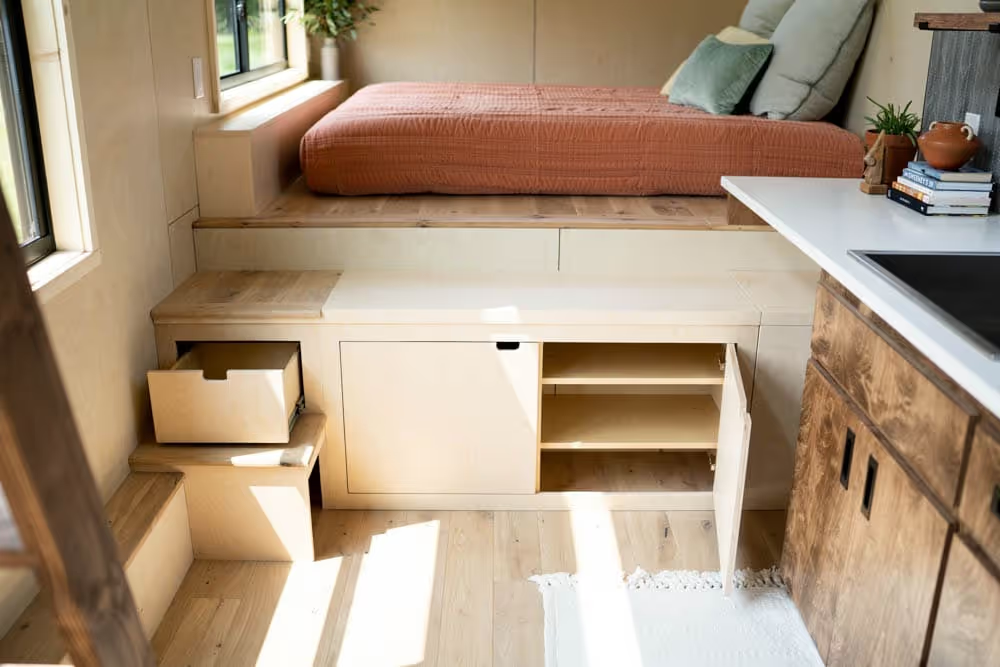Tiny Home Resources
Crisis Preparation for Tiny Living
Written by:
Wind River
April 24, 2024
Back to all Blog Posts.
View more Wind River in the media.
View all Blog Posts.
Tiny Home Resources
Written by:
Wind River
April 24, 2024
Back to all Blog Posts.
View more Wind River in the media.
View all Blog Posts.
Living in a tiny home can be both rewarding and challenging at times. But one thing you should always feel in your tiny home is safe and secure. Extreme weather and natural disasters are becoming more and more common—roughly a 400% increase in recent decades according to the World Meteorological Organization. So, how do you prepare for potential crisis while living tiny? The good news is that tiny houses—if built, set up, and secured properly—can be just as safe as traditional houses. Also, with proper crisis preparation for tiny living you can be prepared for any unexpected circumstances that come your way.
In this post, we’ll mostly talk about what supplies are good to have on hand in case of emergency and creative storage solutions for these supplies for tiny living. However, in any discussion about extreme weather, it’s important to consider a few things regarding the construction and set up of your tiny home. Remember that tiny homes are built to travel down the road at high speeds. This means, if built well, they should be able to withstand hurricane-level winds.
That being said, you’ll want to be sure your tiny home is properly anchored, regardless of living in an area with high winds or not. Check out our post on Setting Up Your Tiny Home – Blocking, Anchoring, and Skirting to learn more about properly securing your home. If you live in an area with tornados, you may want to consider getting a small storm shelter or having a storm radio and alternate plan if you need to take shelter.
When thinking about food, water, and supply storage, you may be thinking that this could be an issue when living small. And yes, storage is definitely at a premium in tiny houses. At Wind River Tiny Homes, we design our homes for maximum efficiency and comfort, which includes offering clients options for creative storage solutions that fit their needs and lifestyle. You can have peace of mind knowing that there is never wasted space and that you can be prepared for the unexpected. Let’s discuss crisis preparation for tiny living in both short-term and long-term emergencies and how to use creative storage options when living in a tiny home.

High-calorie and nutrient-dense canned and boxed foods can be beneficial in many short-term scenarios. Luckily, many of these items can be packed tightly in a fairly small space, so it shouldn’t be difficult keeping some on hand.
Stock your short-term food supply with:
Dehydrated food is a great option, such as freeze-dried meats or dehydrated emergency food available in the camping section of most sporting goods stores. Most of it has a 25-year shelf life. ReadyWise is a common brand used as an emergency food supply. It can come in various size options—such as buckets or packets—and flavors. Since these are not items you’ll need often, you can put them in a less accessible spot. Storage lofts or extra space in built-in couches, etc. can be a good option. The back of a lower cabinet or utilities cabinet can also work well. Determine how much long-term food supply you want to have and then decide where to put it. Choose a spot that does not work well for items you use often.
Being able to produce your own means of food is also a good option, like planting your own micro-garden or learning how to hunt, fish, or gather. The equipment needed for these tasks can be stored in an outdoor storage shed, which means you won’t have to sacrifice precious space inside your home.
Stock your long-term food supply with:
Water is essential to have on hand when preparing for serious events like a natural disaster. You can only survive three days without water, and each person needs one gallon of filtered water per day (not including water necessary for cleaning and cooking). Having a clean water source is imperative, but luckily, this doesn’t have to mean storing bulky gallons of water.
Stock up on these items for water preparation:

Plan to be without electricity in the event of a natural disaster. Obtaining alternative sources for light could be a great way to stay prepared.
Medical emergencies or accidents can happen at any time. Having your own medical supplies on hand in the event of electricity loss and poor weather conditions is a good idea. Stock up on these items for medical and personal preparedness.
Medical Supplies:
Personal Hygiene Supplies:
Being prepared for extreme weather is especially important in areas prone to natural disaster and colder northern regions. Stow away these items in your outdoor storage for unexpected weather conditions and emergencies.


Ultimately, you may be thinking that there is no way your tiny home has enough storage for this level of preparation. But with creative storage solutions that maximize every square inch of your tiny home, you may be surprised that everything can have its own unique system and space. Some of these creative storage solutions include under-sofa storage options, storage stairs, an inset medicine cabinet or vanity shelf, and built-in closets, utility cabinets, and pantries. Additionally, exterior storage options are a great alternative for many items that do not require climate control.
Previous Post
next post
Looking to read more articles like the one above? Follow the links below to peruse similar content now.